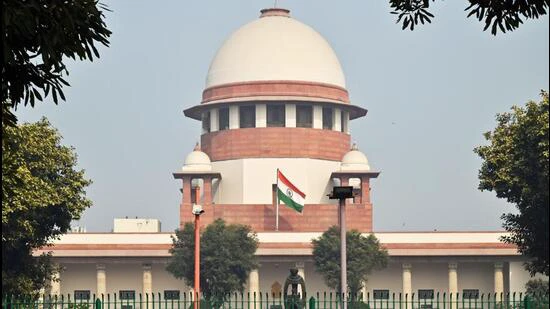The Supreme Court on Thursday pulled up the Delhi government and municipal authorities for failing to implement their regulations on managing stray dogs, even as it reserved its verdict on pleas to suspend an August 11 order of a two-judge bench that directed the mass capture and sheltering of such animals across the Delhi-National Capital Region.
The court did not clarify when the order would be delivered.
“You frame laws and rules, but do not implement them. On one hand, humans are suffering, and on the other, animal lovers complain of non-adherence to rules. Animal boards and authorities do nothing. They should have implemented their own rules, but they do nothing,” the three-judge bench led by Justice Vikram Nath told additional solicitor general Archana Pathak Dave, who appeared for the Delhi government.
The court’s rebuke came during a charged hearing on the legality and feasibility of the August 11 directions issued by justices JB Pardiwala and R Mahadevan. Those directions mandated civic bodies in Delhi, Noida, Ghaziabad, and Gurugram, later expanded in a written order to include Faridabad, to round up all stray dogs within eight weeks and keep them in dedicated shelters, with no captured dog to be released back on the streets.
Solicitor general Tushar Mehta, also appearing for the Delhi government, defended the need for urgent intervention, pointing to “shocking” cases of child mutilation and deaths from dog bites. “There is a very vocal population in every country. We have seen videos of people eating meat and then projecting themselves as animal lovers. Children are dying because of dog bites. It is very painful. Sterilisation does not stop rabies or the mutilation of children. Dog bites count for 37 lakhs a year. Dogs are not to be killed but must be separated, sterilised, and treated well. This court has to find a solution,” Mehta said.
But a battery of senior advocates appearing for animal welfare groups and activists urged the bench to stay key portions of the August 11 order, arguing that it disregarded the Prevention of Cruelty to Animals Act, 1960, the Animal Birth Control (ABC) Rules, and multiple prior Supreme Court rulings requiring sterilisation and immunisation, not mass removal, as the lawful method of managing stray populations.
Senior advocate Kapil Sibal, representing NGO Project Kindness, said: “You cannot pass orders in ignorance of the laws and rules concerned. Dogs are being picked up without adherence to any rules or regulations…The direction of putting them in shelters does not arise when there are no shelters. They should not be picked up and must be released back if picked up for sterilisation. They are going to be culled. Seven dogs have already been picked up, and we do not know where they are.”
Senior counsel Abhishek Manu Singhvi added that government statistics tabled in Parliament two weeks ago showed “no deaths due to dog bites in Delhi between 2022 to 2025,” casting doubt on the urgency claimed by the Delhi government.
Senior advocates Anand Grover, Sidharth Luthra, Siddharth Dave, Aman Lekhi, and Colin Gonsalves also supported a stay, noting that the August 11 order had been passed without hearing NGOs and other stakeholders, and that similar directions were now being issued by other high courts.
One lawyer, however, stressed the need to “also safeguard the interest of human beings,” saying those advocating for strays “have to also bear some responsibility.”
The bench reserved its order after asking the Delhi government to clarify whether it intended to abide by the statutory rules. Dave assured the court: “We will comply with all the directions to be passed by the bench.”
Thursday’s proceedings followed Chief Justice of India (CJI) Bhushan R Gavai’s rare administrative intervention a day earlier, when he withdrew the suo motu case from the Justice Pardiwala bench and reassigned it to the present larger bench headed by Justice Nath.
The move came after advocate Nanita Sharma, for NGO Conference for Human Rights (India), told the CJI on Wednesday morning that the August 11 directions conflicted with a May 9, 2024 Supreme Court judgment that had closed a long-running batch of stray dog management cases, prohibited indiscriminate killing of community dogs, and required strict adherence to the PCA Act and ABC Rules.
CJI Gavai initially noted that “the other bench has already passed orders,” but assured Sharma he would “look into this.” Hours later, the case was listed before justices Nath, Sandeep Mehta, and NV Anjaria, along with a fresh petition on the same issue filed on Wednesday morning.
The August 11 order had drawn immediate criticism from animal rights groups, who warned that sweeping removal measures could cause unnecessary suffering and undermine proven, humane strategies such as sterilisation, vaccination, and community feeding.
The detailed written order, released on Wednesday even as the matter was being reassigned, sought to incorporate welfare safeguards, directing that dogs in shelters not be mistreated or starved, that overcrowding be avoided, vulnerable dogs be housed separately, and that timely veterinary care be provided. It also allowed adoptions subject to strict conditions and the Animal Welfare Board of India’s protocols, warning that any re-release of adopted dogs into public spaces would attract “the strictest of action.”
The suo motu case was triggered by the death of a six-year-old Delhi girl from rabies following a dog bite, with the Pardiwala bench citing “disturbing patterns” of dog-bite incidents and local agencies’ inability to keep public spaces safe. But for now, whether its contentious August 11 order will survive awaits the reserved judgment of the new bench.
